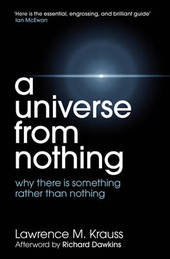
|
A Universe From Nothing
Paperback / softback
Main Details
| Title |
A Universe From Nothing
|
| Authors and Contributors |
By (author) Lawrence M. Krauss
|
| Physical Properties |
| Format:Paperback / softback | | Pages:224 | | Dimensions(mm): Height 198,Width 130 |
|
| Category/Genre | Popular science
Cosmology and the universe |
|---|
| ISBN/Barcode |
9781471112683
|
| Classifications | Dewey:523.18 |
|---|
| Audience | |
|---|
|
Publishing Details |
| Publisher |
Simon & Schuster Ltd
|
| Imprint |
Simon & Schuster Ltd
|
| Publication Date |
13 September 2012 |
| Publication Country |
United Kingdom
|
Description
Internationally renowned theoretical physicist and bestselling author Lawrence Krauss offers provocative, revelatory answers to the biggest philosophical questions: Where did our universe come from? Why does anything exist? And how is it all going to end? 'Why is there something rather than nothing?' is the question atheists and scientists are always asked, and until now there has not been a satisfying scientific answer. Today, exciting scientific advances provide new insight into this cosmological mystery: not only can something arise from nothing, but something will always arise from nothing. A mind-bending trip back to the beginning of the beginning, A Universe from Nothing authoritatively presents the most recent evidence that explains how our universe evolved - and the implications for how it's going to end. It will provoke, challenge, and delight readers to look at the most basic underpinnings of existence in a whole new way. In the words of Richard Dawkins: this could potentially be the most important scientific book since Darwin's On the Origin of Species.
Author Biography
Lawrence Krauss, a renowned theoretical physicist, is the president of The Origins Project Foundation and host of the Origins Podcast. He is the author of more than 300 scientific publications and nine books-including the bestselling The Physics of Star Trek-and the recipient of numerous international awards for his research and writing. Hailed by Scientific American as a "rare scientific public intellectual," he is also a regular columnist for newspapers and magazines and appears frequently on radio and television.
|